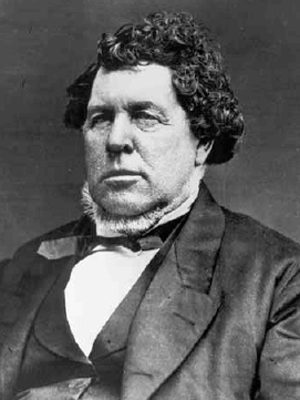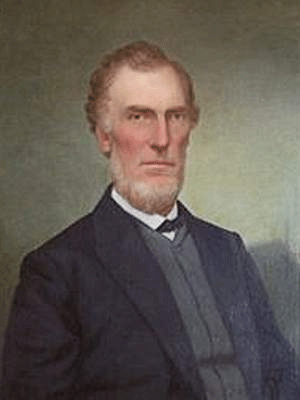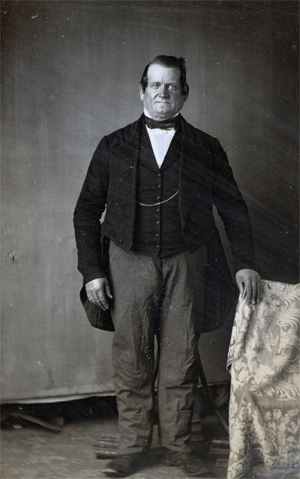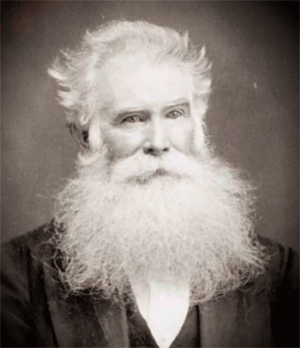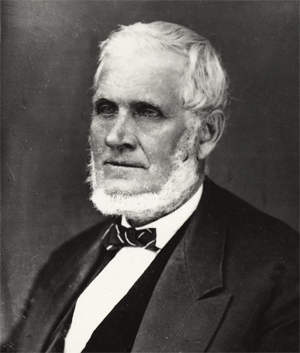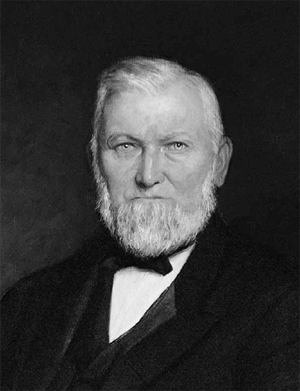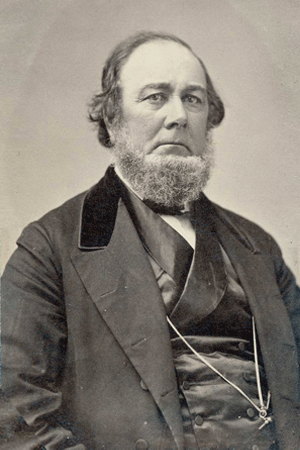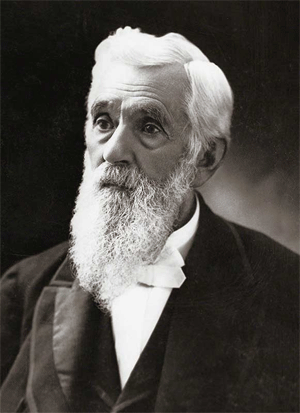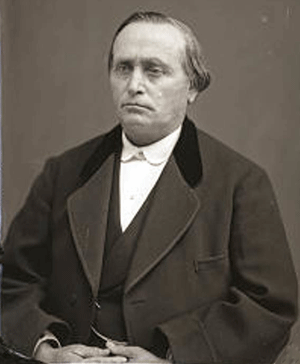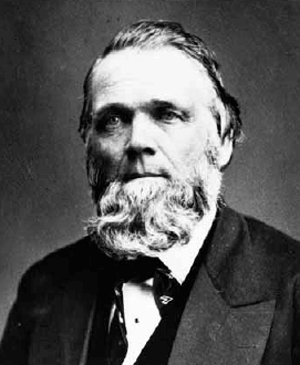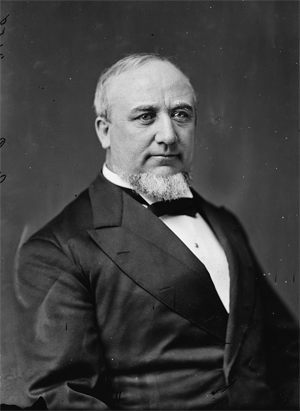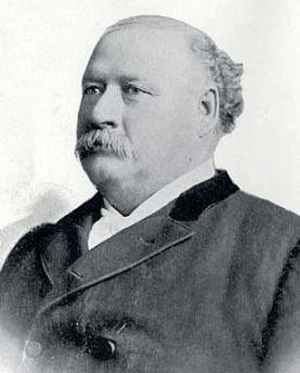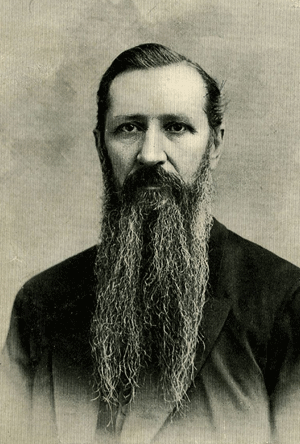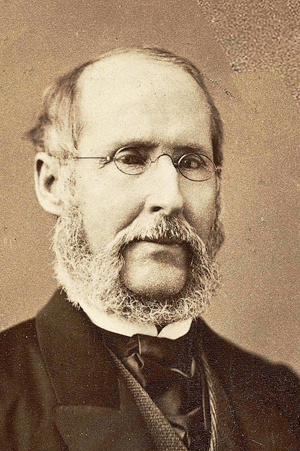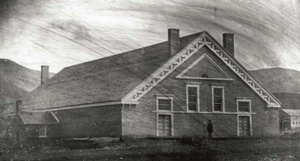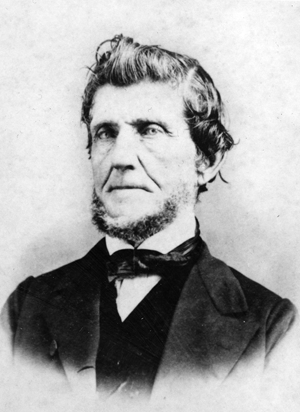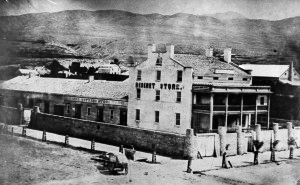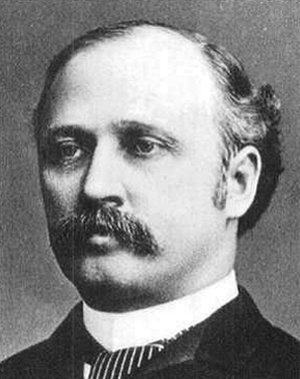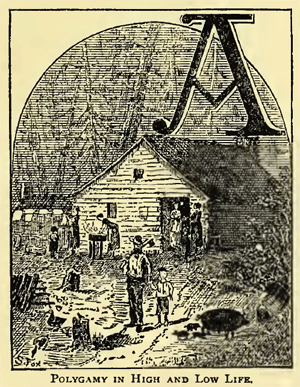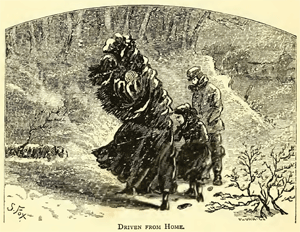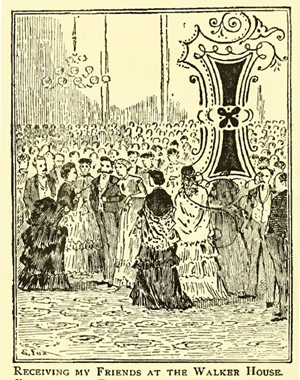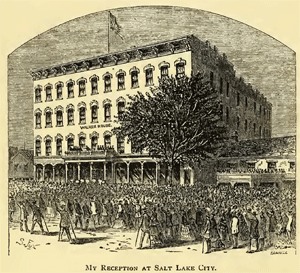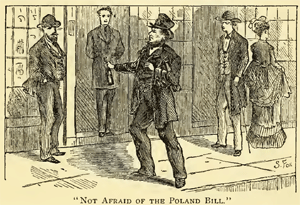Mormon Administration. The Earthly Trinity. Filling Vacancies. Mormon Apostles. Polygamy made Profitable. The Seventy. Two-Dollar Blessings. Astounding Promises. Bishops and Spies. The 'Order of Enoch. All things in Common. An Apostolic Row. How Enoch Works. A Stupid Telegram. Logic Extraordinary. A Gigantic Swindle. Zion's Co-operative Mercantile Institution. Brigham's Revelations. The Saints Laugh in their Sleeves. "It pays to be a Mormon." Beginning to see through It. The Apostate President.
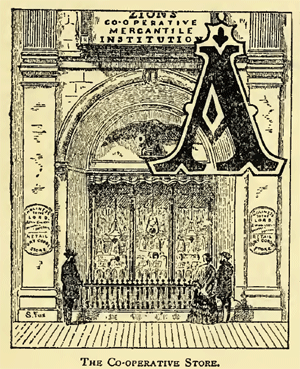
The Co-operative Store.
ALTHOUGH the power wielded by Brigham Young is absolute, he is ostensibly assisted in the administration of church affairs by a large number of officers, whose real business it is to see that the President's plans are carried out, and his commands obeyed. He is the motive power, and they are mere tools in his hands, to be employed as he sees fit.
The "First Presidency," which controls the whole church, is supposed to be the earthly representative of the Trinity, "the Eternal Godhead, Three in One," and consists of the President and the First and Second Counsellors, who are the types on earth of "the Father, the Son, and the Holy Ghost," in heaven. It is needless to say which rank Brigham assigns to himself.
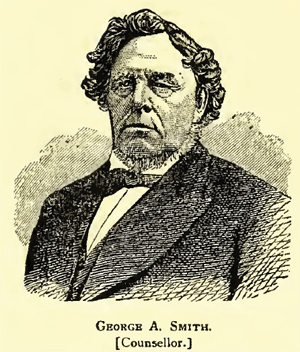
GEORGE A. SMITH. [Counsellor.]
George A. Smith
His first counsellor, George A. Smith, has recently died, and it is yet undecided who shall fill his place. If the plan was followed which raised Brigham to his present position, the second counsellor would have it by right of seniority; but the general impression is that "Young Briggy" will be jumped into the position, and the Saints will be obliged to receive him as certain "successor," whether they wish it or not. They will have less difficulty in becoming reconciled to the inevitable, since he has been for so long a time persistently thrust upon the people as the "probable successor," that they have grown used to hearing his claims discussed.
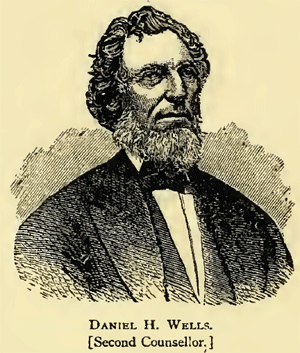
Daniel H. Wells. [Second Counsellor.]
Daniel Hanmer Wells
The second counsellor is Daniel H. Wells, who is notoriously one of the most cruel, bigoted, and tyrannical men in Utah. He, like Smith and Brigham, has the title of "Prophet, Seer, and Revelator."
The Prophet Wells served for years as general, or commander-in-chief, of the Mormon army; and has ever been Brigham's right-hand man in iniquity, fearlessly disposing of life and property in the name of the Lord, counselling his superior to deeds of blood without number, and then treating with the most consummate cruelty the very men who have assisted him in the carrying out of his atrocious plans. He is Mayor of Salt Lake City, and stands high among the dignitaries of the church, but he rules with an iron hand, and cruelty and oppression predominate in all he does.
Orson Hyde
The "apostles" rank in church affairs next to the First Presidency. There are twelve of them, and Orson Hyde is their worthy President. This apostle is a practical polygamist, as are all the rest, but he has a convenient way of utilizing the system. He marries a cook, a laundress, a seamstress, a dairy-maid, or any servant he may happen to need. It is so much cheaper to marry domestics than to hire them. Under the latter arrangement he would be compelled to pay them for their services, while by the former he is only obliged to give them shelter, food, and clothing. His wives represent nearly every nationality, and when visitors come to the house, the first Mrs. Hyde introduces her husband's other wives, as "Mr. Hyde's German wife, Mr. Hyde's English wife, Mr. Hyde's Danish wife," and so on, until all are presented.
He apostatized in 1833, and made some remarkable revelations concerning Smith's polygamous practices, but he soon found his way back into the church, and has been one of the most stanch allies of the Prophet. He is supposed to have been connected with some of the most atrocious murders which have been committed in Utah. William Hickman implicated him most seriously in his confessions.
Orson Pratt
Next to him comes Orson Pratt, who has six wives and several children, and is by far the most able man in the church.
John Taylor
Willard Woodruff
Charles C. Rich
Lorenzo Snow
Erastus Snow
Franklin D. Richards
George Q. Cannon
Brigham Young, Jr.
Joseph F. Smith
Albert Carrington
The other apostles are John Taylor, the happy husband of six wives; Willard Woodruff, whose kingdom numbers but four; Charles C. Rich, who has an indefinite number of wives and fifty children; Lorenzo Snow; Erastus Snow, whose kingdom is the size of Woodruff's; Franklin D. Richards, who has five wives of his own, and in addition has five "proxies," who, before becoming his wives, held the less responsible positions of aunts-in-law. On his uncle's death, Richards assumed the earthly care of them, and promoted them to be members of his own family; George Q. Cannon, the Mormon politician, who repudiates polygamy in Washington, but is one of its most ardent supporters, both theoretically and practically, at home, having four wives and thirteen children; Brigham Young, Jr., whose family has already been described; Joseph F. Smith, who has three wives; and Albert Carrington, who holds the office of Church Historian.
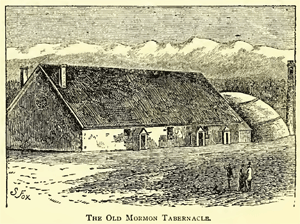
The Old Mormon Tabernacle.
The Old Mormon Tabernacle
The apostles have a general supervision of the Territory. They also go on missions, edit magazines, or take charge of the newly selected "stakes."
The working body of male Mormons is divided into seventy quorums, each having seventy members. Each quorum has a president, and these constitute the "Seventy." These presidents also have a president, who ranks next to the apostles. This body, the Quorum of Seventies, might with propriety be called the Mormon Missionary Board, as they attend to all matters connected with the propagation of the faith. The present president is Joseph Young, brother to Brigham.
JosephYoung
In the year 1834, while the Saints were in Kirtland, Brigham's father expressed a desire to bless his children before he died, as did the patriarchs of old. On mentioning the subject to Joseph Smith, he, as usual, had a revelation that the Lord wished every father to bless his children, and that there should be Patriarchs set apart to bless those who had no father in the church. The first Patriarch was "Old Father Smith," Joseph's father, and his business was to bless all the fatherless who applied to him for blessing. At that time blessings were free for all who sought them; but when the first Patriarch died, and was succeeded by his son Hyrum, the business became so engrossing that it was thought best to charge one dollar for every person blessed. Hyrum was succeeded by "Uncle John Smith," his cousin, and he by William Smith, son of Hyrum. The only necessary qualification for this office is to be a Smith, and in some way a relative or descendant of the Prophet.
These "blessings" are rather wonderful affairs; they promise all sorts of things, in a vague, indefinite way, if only the recipient proves "faithful." Some are assured "they shall never taste death, but live until Christ comes, and be caught up to meet Him in the air;" others are assured that they are to have the privilege of redeeming their dead so far back, that there shall not be a broken link in the chain. Absurd as all this seems, there are hundreds of Saints who believe that "every word shall be fulfilled," as they are sometimes promised unconditionally, and the office of Patriarch is quite a profitable one, now that the price of blessings has been advanced to two dollars.
The bishops act at once as ecclesiasts, directors of municipal affairs, and judges of probate. Salt Lake City has twenty-one wards, each of which has a bishop over it. The entire Territory is also divided into wards, each with its governing bishop. Their duty is to settle disputes in the church, and to act as general spies and reporters, alike over Mormons and Gentiles.
In this last duty they are assisted by the Ward Teachers, whose duty it is to visit all the people in their ward, report all suspected persons, catechise every one, and discover all heresies, false doctrines, and schisms among the people, who are obliged to answer every question which is asked them, reserving nothing. Through these spies and informers, and their superiors the bishops, Brigham knows all the most private affairs connected with every individual, and this knowledge serves to render more binding his hold on this people.
Although the Ward Teachers are subordinate to the bishops, indeed, are the agents by which the latter do their work, they do not rank next to them. This position is held by the High Counsel. This body constitutes a sort of court of appeals, when the bishops do not give satisfaction to litigants. Appeal may be made from the High Counsel to the First Presidency.
In the early days of the church, the duty was strongly enjoined of consecrating all the possessions to the Lord; and this was not to be a figurative, but a real consecration; in which all the possessions were to be catalogued and consecrated in legal form, and the transaction authenticated by witnesses. The custodian of this property was to be a "Trustee in Trust," the community into which the faithful Saint thus entered was to be called "The United Order of Enoch," and the property was to be held for the benefit of this community.
ENOCH
The living channels of the Secret Tradition in Israel -- otherwise the successive mouthpieces -- according to the Tradition itself, are Enoch, Abraham, Moses, Solomon, and then -- after long ages -- one born far after due time, Rabbi Simeon ben Yochai at the beginning of the Christian Dispensation, a Greater Exile for Jewry. The romance-writers -- who passed as historians of Masonry before and after the formation of the UNITED GRAND LODGE -- knew nothing whatever of the last, for Kabalism was reflected into their reveries at second and third hand. But they knew -- confusedly and vaguely -- that there was a Secret Tradition in Israel, and some gleams concerning it were splintered on their glass of vision from people not themselves, and not of the Masonic Brotherhood, who derived certain rumours at a distance from yet others, being those who had dipped into Picus de Mirandula, Reuchlin, Archangelus de Burgo Nuovo and Baron Knorr von Rosenroth. The manner in which it was reflected revealed to them Masonry everywhere, or if any of the goods and chattels in which they and their authorities dealt could not be called Masonry by any stretch of a Georgian cum William IV imagination, it was then a debased substitute. Of Enoch who walked with God till he was not for God took him there are strange theosophical reminiscences in the SEPHER HA ZOHAH and its adjuncts; there are also Talmudic stories. Their final reflection into the annals of Masonry was summarised as follows in the year 1764."Enoch, the fifth from Seth, who prophesied of the deluge and conflagration, lest arts and sciences should slip out of the knowledge of men, raised two columns, one of brick, the other of stone, and inscribed their inventions upon them, that, if the pillar of brick happened to be overthrown by the Flood, that of stone might remain; which Josephus tells us was to be seen, in his time, in the land of Siriad."
Enochian Initiation. -- The significance of the name Enoch, otherwise Henoch ---- connects in Hebrew with instruction, which offered to Masonic minds of the past a path of easy transition to the notion of initiation. To him therefore is referred the first institution of Mysteries, or alternatively their specific development and direction. Such a notion is of course implied by the attribution of the Secret Tradition to which I have referred. It is current in two forms, being that according to which he was the recipient of heavenly wisdom sent down from heaven itself, in the shape of arch -- natural books, and that which represents him as taught by earlier patriarchs, who were taught themselves by Adam, that mournful custodian of Divine Science reflected from the lost estate of Paradise. The approximate source of both is the SEPHER HA ZOHAR, behind which lies a mass of oriental tradition, a part only of which has been gathered into the Talmuds.
Enoch in the Zohar. -- The heads of tradition in the ZOHAR may be summarised shortly thus: (1) THE BOOK OF THE GENESIS OF MAN, containing the Mystery of the Name of God, was communicated to the first man, and it taught him the Supreme Wisdom. (2) It came down from heaven, being carried by a Master-Angel. (3) When Adam was driven out of Eden he held it close to his breast, which notwithstanding it vanished out of his keeping, but was restored afterwards because of his tears and prayers. (4) The Angel by whom it was brought originally is he who is called Raziel, and he is the Chief of Supreme Mysteries. (5) The Angel by whom it was returned is named Raphael. (6) The contents were to be kept secret, for Hadraniel -- another angel -- informed Adam, that, none of the heavenly choirs were permitted to know the central secret therein. (7) It related to the foundation of the world in wisdom. (8) Before he left this life, it would appear that Adam had authority for the transmission of the book to his Son Seth, its later custodians being Enoch, Noah and Abraham. (9) The most favoured of all was Enoch, for to him were confided "all treasures of the celestial world," and his place was in the superior heaven. (10) He beheld the Tree of Life in the midst of the Garden. (11) This was presumably after his translation, when it is even said that he became Metatron, the Great Angel of the Presence, the vesture of Al Shaddai and the Chief of the Heavenly Legions. (12) After God took him it is said that the Book of Adam was known as the Book of Enoch. These extracts are derived from Section Bereshith and from the Appendix entitled Tossafoth at the end of the Commentary on EXODUS.
The Magical Tradition. -- There is extant a BOOK OF RAZIEL, which belongs to the magical side of Kabalism, and it represents the Secret Tradition as descending from Adam to Enoch, but that tradition is presented under aspects by which it calls to be distinguished from the sacred storehouse of Zoharic theosophy. There is also the BOOK OF ENOCH, to which a place of importance is assigned among Old Testament Apocrypha. It has been referred to various dates and among others to the beginning of the Christian era. As it contains the supposed visions of the patriarch, there is no need to say that it does not pretend to be "the book sent down from heaven." It is of the class of apocalyptic writings, and Augustus Le Plongeon supposes that under this form the author delineated the circumstances and experience of his initiation into the Mysteries -- whether those of Eleusis, Isis or Mithras does not appear. There is as much and as little reason to adopt this scheme of interpretation in the case of the BOOK OF ENOCH as there is in that of REVELATION. Indeed the great dramatic pageant which unfolded for him who was "in the spirit on the Lord's Day" -- were there a choice between two impossibilities -- might be less intolerably regarded as a Rite reserved to epopts under the regis of a Secret Church in Christ. Those who are concerned can make a comparison of the texts on their own part, and I leave it in their hands. Be there added as an obiter dictum that in its true understanding the life of vision is an ordered life of initiation, and this is the sense in which Novalis said that our life is not a dream but that it ought to become one. Is there any initiation in the wide and age-long world of Instituted Mysteries to compare with that vision which was granted in Dominica suprema to the Seer of Patmos?
-- The Ancient and Primitive Rite of Memphis and Misraim, Extracts from "A New Encyclopaedia of Freemasonry," by Arthur Edward Waite
The Saints did not take kindly to the Order, and it existed in theory merely. Within a year or two Brigham has been making the most arduous efforts to bring his followers into this community, meeting, however, with very little better success than its founders. When he first proposed its re-establishment, it was decidedly opposed in the Tabernacle, by the apostles Orson Pratt, John Taylor, and George Q. Cannon, and a regular quarrel took place; the Prophet and his dissenting followers parting, each with a firm determination not to yield to the other side. The next week the four went north on a preaching tour, and labored harmoniously together in the attempt to build up the Order.
Whoever joins this community gives all his earthly possessions into the keeping of Brigham Young. His children, too, are required to sign away all claim or title to the property; if any are too young to write, the pen is given them, and their hands guided by their elders, and they are thus deprived of their rightful patrimony; and in return for all this, the family is to be furnished with what food and clothing the officers think they require.
As Brigham and his co-workers journeyed northward, he telegraphed to the bishops of the various settlements through which he would pass, informing them what time he would visit them, and requesting them to call special meetings of the residents of their wards before his arrival, and read to them the following telegram: "I am coming north, organizing branches of the Order of Enoch; how many of you are willing to join the Order without knowing anything about it?"
In the little town of Fillmore seventy-five men responded to the call for a meeting, and, strange as it may seem, fifty of those men voted to join the "Order." They fully understood that all on becoming members were required to deed their property to the "Trustee in Trust," otherwise, "Brigham Young, his heirs, executors, and assigns," yet they decided, with full knowledge of this, to make a blind investment of all their "worldly gear," and upon the arrival of the religious Autocrat, one half of the remaining twenty-five accepted the situation, and signed their names to an agreement binding themselves to obey "Enoch's" requirements. The following were the unanswerable arguments which Brigham used to secure their conversion: "I want you to understand that the car (meaning Enoch) is rolling on. The set time of the Lord has come, and no man can stay its progress. If you do not want to be run over, jump on, or get out of the way. I do not want a part of your property, I want it all. If there are any of you who cannot abide the requirements of the Lord, I do not want you to come near me, or to speak to me. I feel as far above you as the heavens are above the earth."
Those who became members of this branch of Enoch worked well, determined to make it a success. All labored together for the interest of the Order, and were credited a certain sum, I think fifteen cents an hour. They were economical, hoping to make the books show a balance in their favor, after deducting expenses of sustaining their families. But there were so many sinecures, and so much mismanagement, that after the lapse of one single summer an investigation of affairs became necessary, and the fact became known that their divinely directed labors had not paid the running expenses of the institution. Many who had expected that the records would exhibit a balance in their favor, awoke to the disagreeable fact that they, as co-partners in the United Order, the grand scheme that was to reconcile "the irrepressible conflict between capital and labor," must discount the sum stipulated as payment for their services. And they are at present in debt for the commonest necessaries of life consumed during their short-lived experiment.
A similar condition of affairs exists wherever this gigantic swindle has been in operation. And while Brigham has been gloating over his ill-gotten gains, he has bound these poor victims more firmly to himself by the terrible bondage of debt. The wildest dissatisfaction exists, and in nearly every county the Order may be regarded as dead, and beyond even the power of Brigham Young to restore.
The Tithing System is a direct outgrowth of "Enoch." When Joseph saw that the people did not take kindly to his community plan, he found it necessary to adopt some other means of raising a permanent fund for the church, and Orson Pratt proposed that every member should every year be obliged to pay one tenth of his income, out of which the church should be supported. This plan met with the approval of the officers, and it has been continued ever since. Every town has its tithing-house, which is in charge of the local bishop. He takes charge of all the goods that are brought in, usually paying himself a handsome commission, and sees, when any quantity has been gathered, that it is transported to the large tithing-house in Salt Lake City.
This tithing-house is under the direct control of Brigham Young, and he, his counsellors and clerks, have the first choice of all the goods that are brought in; the remaining stores are dealt out as payment to the poor men who are employed by Brigham as laborers. I have seen the tithing-store beseiged by a crowd of tired, care-worn women, wives of these men, waiting for their turn to be served. Sometimes a poor woman will stand all day waiting for a sack of flour, a basket of potatoes, or a quart of molasses. Let the day be ever so cold or stormy, there she must wait, until the clerks see fit to attend to her wants.
Everything is received here in payment for tithing: hay, grain, vegetables, butter, cheese, wool, or any other product. If a man has not money, he must give one tenth of what he has. It matters little whether he can afford it; the church demands it, and "the church" gets it.
The nearest approach to the practical realization of the Order of Enoch was what is called Zion's Co-operative Mercantile Institution. This was a great commercial corporation, engaged in buying and selling the produce of the people, and supplying them with every kind of merchandise needed in a new country. The stock was held by the people of the Territory, and branches of the parent concern were scattered throughout all the leading settlements; so that all the commercial exchanges of the country might be made through this establishment. It was designed to destroy the business of Gentile merchants in Zion, and accordingly all were commanded to patronize it; but the completion of the Pacific Railroad, and the influx of Gentiles, came to the relief of the proscribed merchants; their goods, too, were of a better class, and there was a greater opportunity for selection, so that Mormons and Gentiles alike patronized them; and at the present time, while the Co-operative Institution seems tottering to its fall, in spite of the frantic attempts of Brigham and his assistants to prop it up and make it secure, the Gentile houses are rapidly gaining in wealth and credit.
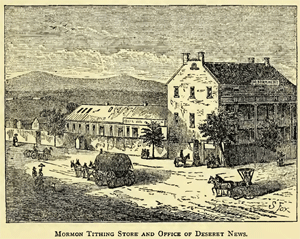
Mormon Tithing Store and Office of Deseret News.
Mormon Tithing Store and Office of Deseret News.
Most of Brigham's "revelations" have met with about the same degree of success in their attempted carrying out. His project of making silk, and another equally wild scheme of producing sugar from beet-roots, were gigantic failures, although he will not acknowledge it. Two more of his "inspirations" are kept in the minds of the Saints, by being so constantly before their eyes. The unfinished mud wall, which was to protect the city from invasion, and the divinely projected canal, which was to bring the stone for the new Temple from the quarries to Salt Lake City, and which Brigham announced that he had seen just as distinctly in a "vision" as he "ever should with his natural eyes." A large amount of money, and a great deal of hard labor was expended on these enterprises; all of which is a total loss.
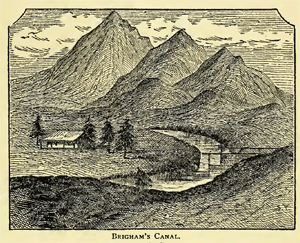
Brigham's Canal.
John Willard Young
Brigham is shrewd enough to see that "revelation" is not one of his strong points, and he rarely attempts it; less frequently now than formerly, even. The catch-words, "Thus saith the Lord," are not nearly so potent as they were before the Saints came so much in contact with the Gentile world, and unconsciously lost some of their superstition. They do not openly laugh at Brigham's prophecies, but a few of the more honest and far-seeing venture to criticise him very quietly, although they submit to his rule, and are seemingly as good Saints as ever. They are not ready to apostatize; their interests and associations bind them to the church, and they do not wish to leave it. Some cling to it, like George Q. Cannon, through ambition; for that young apostle dares to cast his eyes toward Brigham's position, and has expressed the belief that he might ultimately succeed him. Others, like Orson Pratt, are so closely identified with it, that they cannot and would not cut themselves adrift from it. The church is their life, and they will only leave one when they are compelled to give up the other. Another class, to which Brigham's sons notably belong, stay because their pecuniary interests demand it. It "pays" to be a Mormon. But when once the present ruler is taken, they will have nothing to hold them, and they will do openly what they have long since done in their hearts, repudiate Mormonism, and all its superstitions and practices. And I am morally certain that the first one to take advantage of his newly-obtained liberty will be John W. Young, who is even now known as "the Prophet's Apostate Son," and who yet, in spite of his apostasy, holds the position of "President of the Salt Lake State of Zion," with the rank of bishop.
John Willard Young (October 1, 1844 – February 12, 1924) was a leader in The Church of Jesus Christ of Latter-day Saints (LDS Church). He is one of the few individuals to have been an apostle of the LDS Church and a member of the First Presidency without ever having been a member of the Quorum of the Twelve Apostles.
Early life and apostolic ordination
Young was born in Nauvoo, Illinois to Latter Day Saint apostle Brigham Young and Mary Ann Angell. As a young boy, John traveled with the Mormon pioneers from Illinois to the Salt Lake Valley.
Young was privately ordained an apostle by his father on November 22, 1855, when he was eleven, without a public announcement or adding them to the Quorum of the Twelve Apostles.[5] Young's ordination was reconfirmed on February 4, 1864, when his brothers Brigham Young, Jr. and Joseph Angell Young were ordained apostles by their father. However, none of them became members of the Quorum of the Twelve Apostles upon their ordination because the Quorum already had twelve members. Although Brigham Jr. eventually became a member of the Quorum of the Twelve, John and Joseph never did.
Activity in western territories
In 1869, Young opened the "Salt Lake City Museum and Menagerie", which was the predecessor of the Deseret Museum.[6] He was also involved with the construction of a railroad in Arizona Territory.
LDS Church service
First Presidency
On April 8, 1873, Brigham Young added John, Brigham Jr., George Q. Cannon, Lorenzo Snow, and Albert Carrington as additional counselors to him in the First Presidency. After Young's First Counselor George A. Smith died in September 1875, John Willard Young was called as First Counselor to his father on October 8, 1876. Young served in this capacity until the First Presidency was dissolved by Brigham Young's death less than a year later on August 29, 1877. During his time in the First Presidency, John Willard Young never spent much time in Salt Lake City attending to church leadership duties; since 1863 he had preferred living in New York City, where he was engaged in a number of business ventures that ultimately failed and resulted in him assuming a large amount of debt.[7]
Counselor to the Twelve Apostles
Having never been a member of the Quorum of the Twelve but holding the priesthood office of apostle, Young was called as a counselor to the Quorum of the Twelve Apostles on October 6, 1877. However, Young's business practices and practice of living in New York City soon brought him into conflict with other church authorities. At a general conference of the church on April 6, 1881, Young's name was withheld from the names of general authorities who were presented for "sustaining".[4] Between 1881 and 1885, he was tried before the Quorum of the Twelve on three separate occasions; each time he was reconciled with the Twelve and he retained his position.[4] In 1888, Joseph F. Smith accused Young of unethically using church funds to maintain a lavish lifestyle, and by April 1889 the First Presidency and Quorum of the Twelve were discussing removing Young from his position.[1]
Young resigned from his position on October 3, 1891; Young was aware that on that date the First Presidency and Quorum of the Twelve Apostles were again discussing his possible release from his position.[1] After Young's resignation, he was formally released as a counselor to the Twelve at a conference of the church October 6, 1891.[1]
Denial of church presidency
Although he lived another 33 years, Young never again served as a general authority of the LDS Church, though he remained a church apostle for the rest of his life. On December 9, 1899, apostle Franklin D. Richards died. Richards had been the President of the Quorum of the Twelve Apostles and the second-most senior apostle in the church. Richards's death left Young as the second-most senior apostle in the church. Although Young did not become the President of the Twelve, under the then-existing rules of presidential succession in the church, Young would become the President of the Church when Lorenzo Snow died, since Snow was the only living person who had been ordained an apostle prior to Young.[8] Snow was 85 years old and in poor health, while Young was only 55 years old; it therefore appeared to many that Young would be the next president of the church.
However, many of the general authorities of the church disliked Young and felt that his succession to the presidency would be a disaster for the church.[8] On March 31, 1900, the First Presidency—which consisted of Lorenzo Snow, George Q. Cannon, and Joseph F. Smith—changed the policy of presidential succession.[9] The new president of the church would no longer be the person who had been an ordained apostle the longest; rather, the new president of the church would be the person who had been a member of the Quorum of the Twelve Apostles for the longest period of time.[9] Since Young had never been a member of the Quorum of the Twelve, he could not become the president of the church if Snow died. On April 5, 1900, the First Presidency and the Quorum of the Twelve unanimously approved the new policy.[10]
On October 10, 1901, Snow died. Five days later, Young arrived in Salt Lake City from New York City, possibly with the intent of assuming the presidency of the church.[11] However, due to the new policy, Joseph F. Smith was ordained the new president of the church on October 17, 1901.[11] Young returned to New York City, where he lived for the rest of his life. After he died in New York City, Young was buried at Salt Lake City Cemetery.
Later life
After returning to New York City, Young was employed as an elevator operator in an exclusive hotel where he had once lived.[11] In 1902 and 1903, his son Hooper Young was involved in a sensational murder investigation and trial after it was determined that a woman had died in John Willard Young's apartment while he was in France on business. The "Pulitzer Murder" case ultimately resulted in Hooper pleading guilty to second degree murder and being sentenced to life imprisonment in Sing Sing prison.[12] Hooper's conviction had a devastating effect on John Willard, who had initially believed that his son was innocent.[12] John Willard Young continued to attend a branch of the LDS Church in the city for the rest of his life,[13] and he died of cancer in New York City at the age of 79.[12]Brigham Young had always expected that his son Brigham Jr. would be his successor. But scandals enveloped the career of the Mormon Dauphin. According to John D. Lee of the Danite intelligence, Brigham Jr. had been put in jail in England, and $26,000 was misdirected from the perpetual emigration fund to secure a cover up of his activities. Then, in Februar 1876, one of the crown prince’s daughters fled with a Gentile. Brigham Jr. had to go to court to get her returned to him. (Hirshson, p. 321)
Brigham Young’s grandson was William Hooper Young. In 1902, this grandson was sentenced to life in prison in Sing Sing by a New York city court. He was convicted of stabbing a woman to death, and then dumping her body in the Jersey Meadows. The Mormon theory that polygamy produced superior individuals seemed to be in trouble. (Hrishson, p. 325)
-- Just Too Weird: Bishop Romney and the Mormon Takeover of America: Polygamy, Theocracy, and Subversion, by Webster Griffin Tarpley, Ph.D.
Notes
1. Compton 2002, p. 125 2. Compton 2002, pp. 111–12 3. ^Since Young was not a member of the Quorum of the Twelve Apostles or the First Presidency at the time of his death, no one was called to the apostleship as a replacement after he died. 4. Compton, "John Willard Young", p. 124. 5. Compton 2002, pp. 111–112 6. Jenson, Andrew. Encyclopedic History of the Church of Jesus Christ of Latter-day Saints (Salt Lake City, Utah: Deseret News Press, 1941) p. 185. 7. Compton 2002, p. 121 8. Compton 2002, p. 126 9. Compton 2002, p. 127 10. Compton 2002, pp. 128–129 11. Compton 2002, p. 129 12. Compton 2002, p. 130 13. Compton 2002, pp. 129–130
References
• Adkins, Marlow C., Jr. (1978), A History of John W. Young's Utah Railroads, 1884-1894(M.S. Thesis), Department of History and Geography, Utah State University, OCLC 4100857. • Bishop, M. Guy (2001), "John W. Young: Counselor to Brigham Young (1873-1877)", in Michael K. Winder, Counselors to the Prophets, Roy, Utah: Eborn Books, pp. 182–189, ISBN 1890718041. • Bishop, M. Guy (Winter 1980), "Building Railroads For the Kingdom: The Career of John W. Young, 1867-91", Utah Historical Quarterly, 48 (1): 66–80. • Compton, Todd (Winter 2002), "John Willard Young, Brigham Young, and the Development of Presidential Succession in the LDS Church" (PDF), Dialogue: A Journal of Mormon Thought, 35 (4): 111–134. • Keller, Charles L. (Summer 1977), "Promoting Railroads and Statehood: John W. Young", Utah Historical Quarterly, 45 (3): 289–308. • Watson, Charles W. (1984), John Willard Young and the 1887 Movement for Utah Statehood (Ph.D. Thesis), Department of History, Brigham Young University, OCLC 16777831.
-- John Willard Young, by Wikipedia (accessed: 6/22/18)

